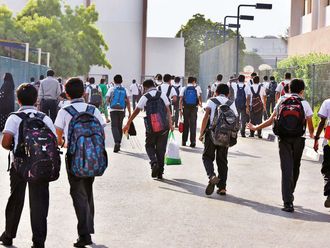Working mothers are run off their feet
If Gulf News is asking how I get to sleep at night, for me and many women, falling asleep isn’t an issue (‘Young UAE residents speak about their sleep habits’, Gulf News, June 10). It starts early in the morning, I wake up at 5am. I pray, prepare my son’s breakfast and his lunch bag. I wake up my son and make sure he is well dressed and well fed. I drive to work. I work for nine hours. Actually, I do the jobs of three people. I go home, I rest for half an hour, take my son downstairs to play with the other children, help him with his shower, make sure he is fed, we work on his homework and put him to bed. Then, I cook dinner for my husband, pray, fold the laundry or wash some dishes or scrub the toilets or do anything that has to be done around the house. Then, after dinner, I clear the table, wash the dishes and get ready for bed. Eventually and miraculously, I just fall asleep – so deep that snoring or any noise outside would never bother me!
From Ms Suzy Sassi
Dubai
Facebook comment
Look up!
I feel that earphones and mobiles are some of the biggest reasons for accidents in many places (‘Girl crosses tracks, hit by train but emerges with minor bruises’, Gulf News, June 10). How many warnings need to be posted all around us in order for us to watch where we’re going? Where has basic commonsense gone? Unless we think and realise this, we will have to face these tragic incidents.
From Ms Krishna Kumari
UAE
Facebook comment
With conflict comes child suffering
World Day Against Child Labour was on June 12 and this year the UN focused on the impact of conflicts and disasters on child labour. UN reports say that more than 168 million children are engaged in child labour globally and mostly around the war-torn areas. Conflicts and disasters displace thousands of children from their homes and they are left behind in poverty, forced to do child labour. In third world countries children are denied the right to education and are forced to work in factories and in unhygienic places for hardly a meal or without any pay. Millions of children are denied their basic rights and are forced to work as slaves for years, unnoticed in factories without any freedom. The recent wars in Iraq, Syria, Libya and Afghanistan have displaced thousands of children away from their homes and they have been separated from their families. They are deprived of love and comfort, which is forcing them to live in harsh conditions with no governments to see the plight of these children. Thousands of children held in refugee camps are denied education and basic rights. Let us hope the UN with the help of other countries will work to protect such children from slavery. Children are the future of every country.
From Mr Eappen Elias
Dubai
Pretending to be perfect
I agree to the fact that social media is making us miserable and the problem is that social media platforms have given us a place to hide behind screens, allowing others to judge us for the lives we want them to think we have (‘Social media makes us miserable’, Gulf News, June 8). It’s easy enough to do. Why would you post a photo of yourself that you think is unattractive? Social media is a world. We live through our screens and many of us feel the need to pretend to do and have whatever we want and wish for.
It’s the only place we can escape the realities we portray to our friends and family. The world was easier when we didn’t have to prove anything to anyone. Social media should be a way to share with your friends how you live without fear of judgment.
Just posting happy and party pictures does not mean one is actually happy! Most of us don’t have perfect lives. So why say otherwise online?
From Ms Megna Rajagopal
UAE
What is the solution?
This is in reference to the suicide and death of farmers due to police firing in some states of India (‘Maharashtra farmer ends life with note for CM’, Gulf News, June 9). Ironically, after the fall of the Congress party in both the central and states governments, farmers’ plight seems to have worsened. Unfortunately, the situation during the United Progressive Alliance (UPA) tenure of 10 years was worse than this and no tangible steps were taken by the UPA government, especially by its agricultural minister.
In any case, whether it is the UPA or the National Democratic Alliance (NDA), it has proved to be the same hurdles not only for farmers, but even the middle class salaried people. Unfortunately, while the salaried class suffer silently, farmers take the extreme step of suicide, which has had no effect on any political leader in our country. We feel all these political leaders should sit across to discuss and come out with tangible solutions to uplift the lives of farmers.
From Mr N. Viswanathan
Coimbatore, India
Editor’s note: Is there a news report that you feel strongly about? Something that has to be addressed in the community and requires resolution? Email us on readers@gulfnews.com. You can also post a comment on our Facebook page or tweet to us @GNReaders.









